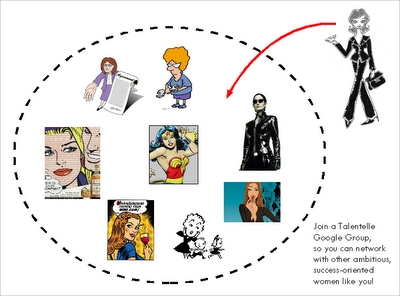Google Groups allows you to share your expertise
 Above is a diagram I created to explain to Talentelle members (www.talentelle.com) the value of joining a Google Group created by Talentelle.
Above is a diagram I created to explain to Talentelle members (www.talentelle.com) the value of joining a Google Group created by Talentelle.Google Groups can be of great benefit to you, and help you to use Linkedin MORE productively.
I really recommend that people get a free account at Gmail and create their own Google Group. A Google Group (GG) is basically a mailing list service, allowing you, the list owner, to email to ALL members of the group. You can invite them by email so that they join your group.
You can decide WHO has permission to post messages to this mailing list.
GG is a great complement to Linkedin, because although Linkedin is great at determining who's who, it doesn't (yet) enable you to know WHO KNOWS WHAT.
Once you create your GG, you can then invite all your Linkedin connections to join your "club" so they can share a bit about who they are, what they do, what their goals are, etc.
A GG is like a virtual party where you invite friends! As the authors of the Cluetrain Manifesto have correctly envisioned, the markets of the future are based on conversations, not superficial marketplaces.
Of course, there's nothing wrong with traditional marketplaces. But when it comes to networking, and I assume most Linkedin users are interested in networking, one has to go deeper and get to know other people. The only way is to start a conversation.
With GG, you can not only talk to your connections (by posting a message, a question, an offer, etc.), but you can also enable your connections to talk to one another.
However, to avoid the risk of spamming, you can restrict posting priviledges to a few people only. For example, if you had 200 connections, but you intimately know only 40 of them, then you can give those 40 close collaborators the permission to post a message in your Google Group. Everybody else can receive the emails but will not be able to post.
In conclusion, I would say that with Google Groups, Google has become one of the most powerful career allies you will ever have -- the only question is, will you take advantage of it?
Oh, it's completely free, by the way! :-)
